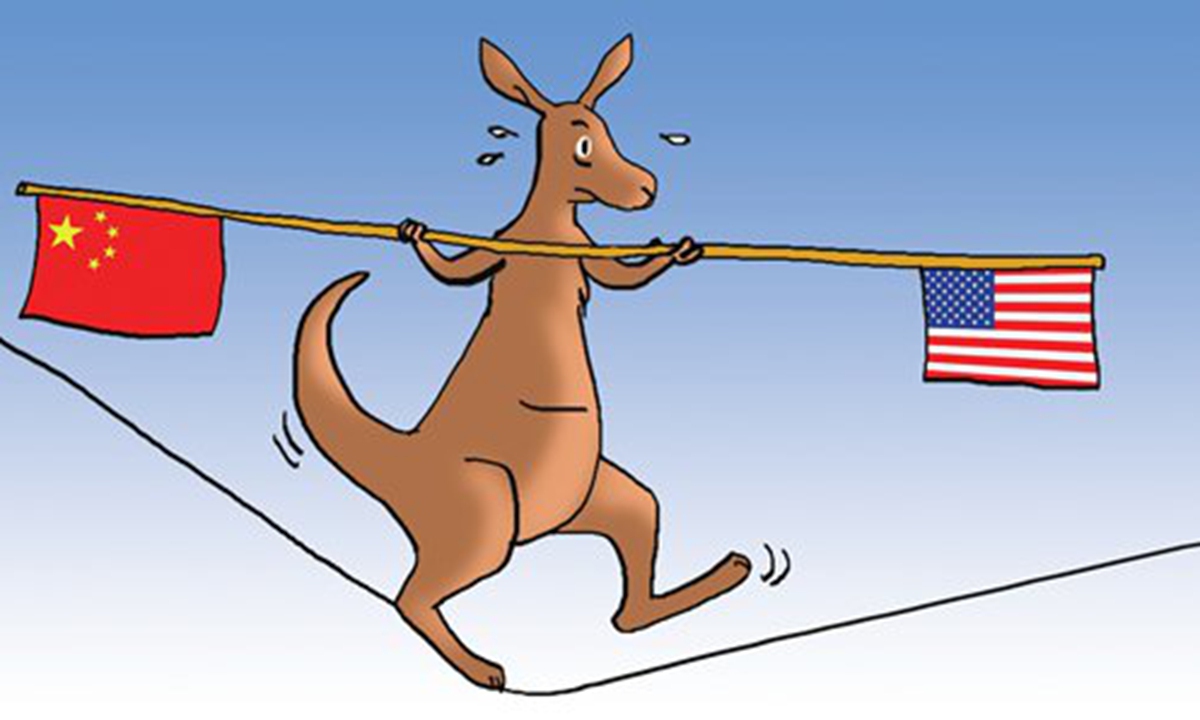Can Canberra's foreign policy really be independent?
By Yu Lei Source: Global Times Published: 2020/8/23 22:08:40

Illustration: Liu Rui/GT
"Turmoil 2020 means Australia's foreign policy is being cast in a new light," the Australian Financial Review (AFR) said in an article on Friday. The article quoted analyses arguing that Australia is not moving toward an independent foreign policy, but a "new" policy, or a distancing from some US politicians' extreme anti-China positions. For example, Australian Foreign Minister Marise Payne said in late July that Pompeo's "positions are his own, Australia's position is our own."
Judged from Australia's overall diplomatic moves after the Cold War, its foreign policy is not substantially different from that of the US. Australia has closely followed the US and has never been neutral or objective on issues including the 1996 Taiwan Straits crisis, the US bombing of the Chinese embassy in Belgrade, Yugoslavia in 1999, and the 2001 China-US mid-air collision near Hainan. The situation is the same in terms of the Hong Kong affairs, South China Sea disputes, US crackdown on Huawei, and the COVID-19 pandemic blame game.
If there is any difference between Australia's and the US' policy toward China, it's because Australia wants to ensure that its exports to China are not seriously affected. This concerns Australia's national interests and is also a rigid demand for Australian people's life and employment. In terms of Australia's foreign policy, people need to focus more on its main thrusts instead of certain piecemeal moves.
In this context, the AFR article quoted the Lowy Institute's Richard McGregor who said that the Australian government is distancing itself not so much from the US "as from the extremes of the Trump administration." However, Australia has always been at the forefront of the Trump administration's suppression of China. Sometimes it even acts as the US' pawn.
Recent minor changes in Australia's foreign policy are mainly due to Canberra's concerns that its trade ties with China would be affected. This thereby damages its urgent need of economic growth.
In fact, a Lowy Institute special report says that the deterioration of Australia's relations with China could constrain Australia's post-virus economic recovery.
Indeed, Australia should pay attention to economic and trade relations with China. Australia's wine industry and international education sector, for example, have been affected by Canberra following Washington's lead to suppress China.
Some Australian politicians "thought their mission was to cheer on the Trump administration," even "making statements which suggest it should go harder on China," according to the AFR article. These right-wing politicians, out of ideological prejudice, hope that Australia will unite the US and launch a new cold war against China. They are trying to tie the entire Australian people to this crazy chariot. But these politicians are not the majority of the country. Many other Australian politicians have realized the huge threats to Australia brought on by a China-US new cold war.
However, Australia may keep on following the US in the foreseeable future for reasons of national security. The US is Australia's largest direct investor. It provides Australia with advanced products and technology to protect Australia's regional hegemony.
China should try to seek common ground with Australia. It is normal that different countries with diverging ideologies and political systems don't always agree - but they should always communicate through multiple channels. We should keep promoting China-Australia cooperation and the economic integration of the Asia-Pacific region. This is in line with both countries' short, near, and long-term interests.
The author is a chair professor at the Research Center for Pacific Island Countries, Liaocheng University. opinion@globaltimes.com.cn
RELATED ARTICLES:
Posted in: VIEWPOINT,OTHER REGIONS